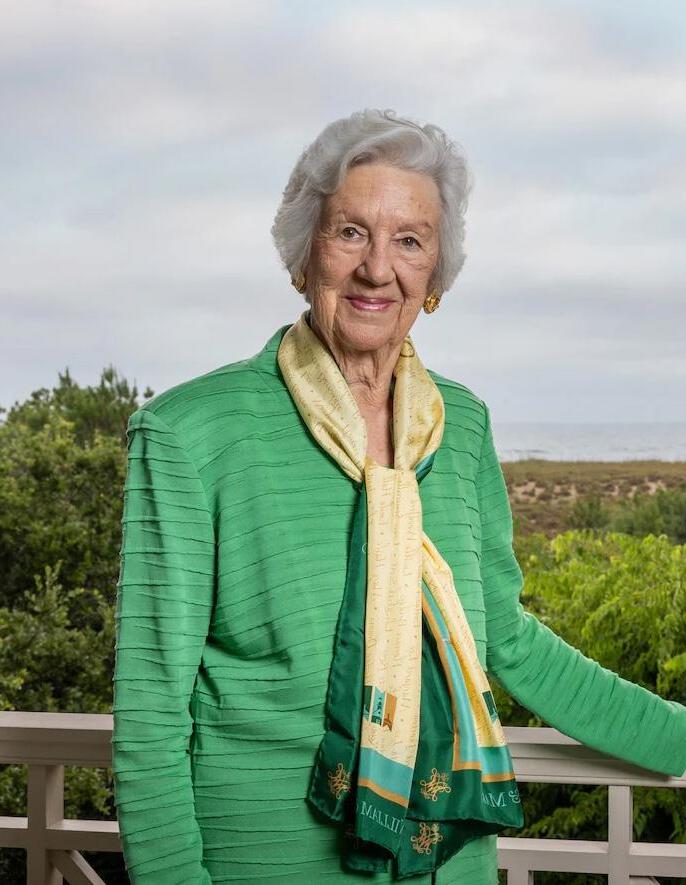

Jane P. Batten Who is A
Biography
Who is Jane Batten?
“I was a West Ghent kid,” says Jane Parke Batten of the Norfolk neighborhood in which she grew up. “By the time I was 8, my friends and I were riding the bus downtown to explore. We were just turned loose. It was a different time.”
That youthful sense of curiosity, coupled with an independent spirit, would come to define Jane’s unique approach to life. And it grew into a remarkable life, one that earned the attention of Virginia’s House of Delegates in 2025 with a resolution that “commended Jane Parke Batten for her unwavering dedication to philanthropy, her visionary leadership, and her profound impact on education, community development, and environmental conservation.”
Today, Jane’s “profound impact” is evident throughout Coastal Virginia, where the Batten name is prevalent. Yet the origins of her influence date back to a childhood that wasn’t typical of the times.
Jane’s parents divorced when she was a baby. Afterward, Jane and her mother, Mary, moved in with Mary’s parents. When Jane was 7, her mother married Hunter Hogan, who later would become prominent in the region’s real estate community. The couple eventually gave Jane five half-sisters, the first of whom was born when Jane was 8.
By the time Jane entered Norfolk Catholic High School, she’d attended four elementary schools. At the last one, Sacred Heart, she graduated at the top of her class.
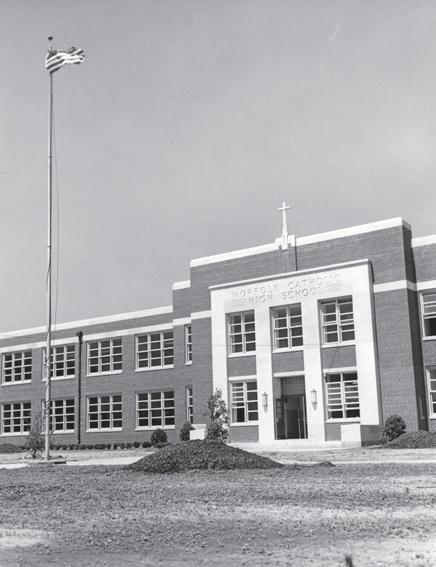
“I was always a good student,” she remembers. “I loved school. I’m easily bored and love to learn new things.” That said, she wasn’t a complete bookworm, having been the only freshman in her class to be chosen as a cheerleader and voted class president.
That’s one example of how even as a teen, Jane embraced life fully. She was an honor-roll student who also played softball and basketball.
She attended summer camp for five years and “was never homesick for a minute.” She was a debutante who also held summer jobs like waiting tables. She read “Lady Chatterley’s Lover,” smuggled to her by her bohemian aunt who worked as the book editor at The Virginian-Pilot.
Who is Jane Batten?
The Norfolk-based newspaper would soon become significant to Jane for another reason. After her sophomore year at Hollins College (now Hollins University), she took a summer job as an assistant to The Virginian-Pilot’s managing editor. And she started dating one Virginia’s most eligible bachelors: Frank Batten, who held an MBA from Harvard and at 27 had been named the newspaper’s publisher. Before the summer ended, they were engaged.
“His friends were all married,” Jane says. “I think I came along at the right time. He was ready.”
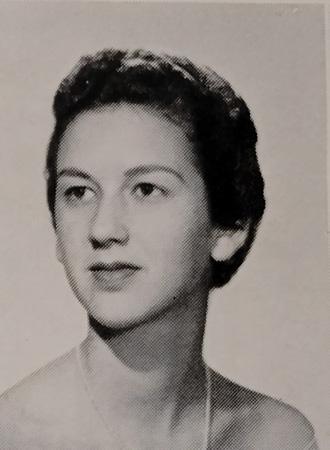
Like Jane, Frank had a non-traditional childhood for the times. When his father died soon after he was born, he and his mother lived with Frank’s aunt and uncle, the Slovers. They owned the local newspaper and raised Frank like a son.
In February 1957, Jane and Frank were married. Frank had just turned 30; Jane was not yet 20.
“I immediately had to be active in the community,” Jane says. “That was expected from day one.”
So was motherhood. Jane was just 21 when their first child, Frank Jr., was born. At 23 she gave birth to Mary Elizabeth, and at 25, Dorothy.
For the next two decades, Jane’s life revolved around raising her children, traveling with Frank on business trips, and serving on nonprofit boards.
Her first board experience was in the late 1950s with Travelers Aid International. “I learned so much from the chair of that board, J.B. Massey,” she says. “He was legendary as the headmaster of Norfolk Academy.”
When her children were older, Jane and a friend created a relocation service to serve clients of the real estate firm Goodman Segar Hogan. “She and I were the pioneers of job-sharing,” she recalls.
All the while her husband was expanding The Virginian-Pilot’s parent company, known then as Landmark Communications. The family-owned media enterprise would come to comprise nine daily newspapers, more than 50 weekly newspapers, TV stations in Nashville and Las Vegas, and a national chain of classified advertising publications.
Jane Parke, Hollins College yearbook
Who is Jane Batten?
In 1960, under Frank’s leadership, The Virginian-Pilot won a Pulitzer Prize for a series of editorials championing desegregation. Later in the ’60s, Frank grew his national reputation by being at the forefront of cable TV development. From 1982 to 1987, he chaired the board of the Associated Press.
But the achievement he’s best known for is co-founding The Weather Channel, which made its debut on cable in 1982. Media experts predicted its quick demise; instead, it shocked the skeptics by thriving.
“I was very proud of Frank,” Jane says. “We were suited in many ways. And he always respected my opinion.”
Among the Battens’ closest friends at the time were Frank and Julia Daniels, owners of the Raleigh News & Observer; and Katharine Graham, owner of The Washington Post. Jane remembers one get-together with them in 1973. After then-unknown Warren Buffett invested in The Washington Post, Graham invited both couples to her farm outside of D.C. to get their thoughts on Buffett and his motivation. Later, Jane would become friends with his sister, Doris Buffett.
While Frank continued building a media conglomerate, Jane focused on community service. That came to include Virginia Wesleyan College after their daughter, Mary, enrolled in 1978. By 1981, Jane was serving on the college’s Board of Trustees. In 1995, she was named chair of the board, the first trustee to serve in that role after the previous chair held the position for more than three decades.
“I helped institute term limits,” she says, smiling.
By then, education had become the Battens’ main philanthropic focus. The couple made major gifts to Harvard Business School, University of Virginia, Hollins University, and Access College Foundation, with schools, institutes, buildings, and scholarships named in their honor.
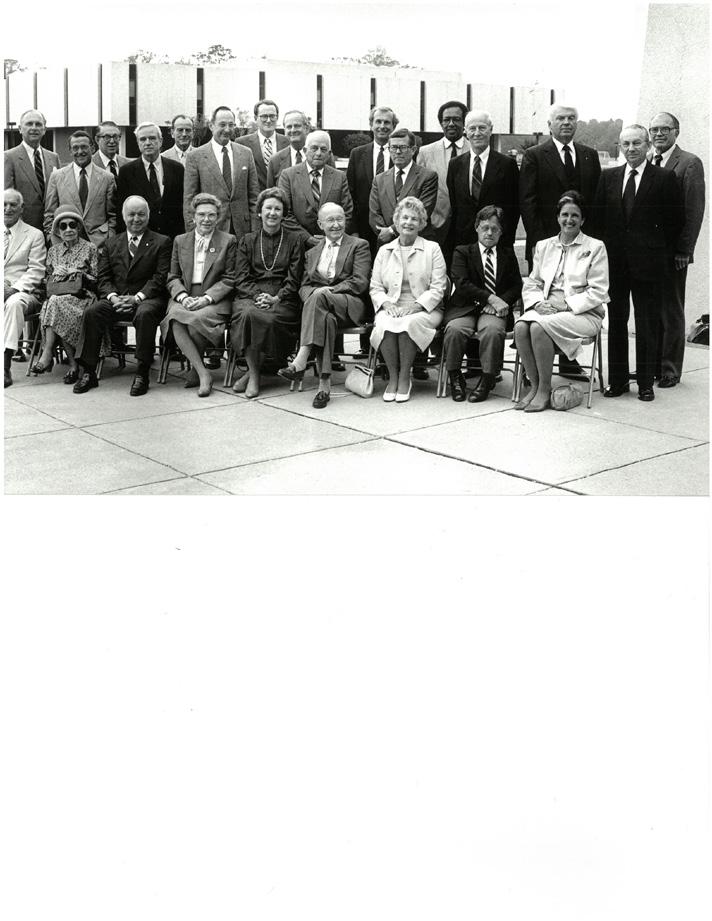
VWU Board of Trustees, 1985
Who is Jane Batten?
The first transformational gift to Virginia Wesleyan arose from Frank’s desire to honor his wife’s service as board chair.
“Higher education has always held great significance for our family,” Frank said in 1998 when the gift was announced. “I take particular pride in Jane’s meaningful leadership role in the development of this emerging institution.”
The building funded by that gift—the Jane P. Batten Student Center—opened in 2002. Before and after, the Battens continued to fund Virginia Wesleyan faculty positions, faculty awards, and student scholarships.
Yet it was only the beginning of Jane’s impact on the institution.
In 2008, Frank sold The Weather Channel. After he died in 2009, “I inherited a huge job,” Jane says of her philanthropic responsibility. “Frank always said that if you take money out of a community, you need to put it back into the community.” By then their three children also had developed philanthropic causes of their own.
Jane soon expanded her giving to include organizations focused on environmental stewardship, an interest nurtured by her involvement with the Chesapeake Bay Foundation.
In 2015, her growing concern for the environment led Jane to announce a major gift to Virginia Wesleyan, one that would fund a revolutionary environmental-sciences center with an adjacent geothermal field, greenhouse, and gardens. The Greer Environmental Sciences Center, named for the college’s retiring president Billy Greer, launched Jane’s futuristic and collaborative vision for Virginia Wesleyan.
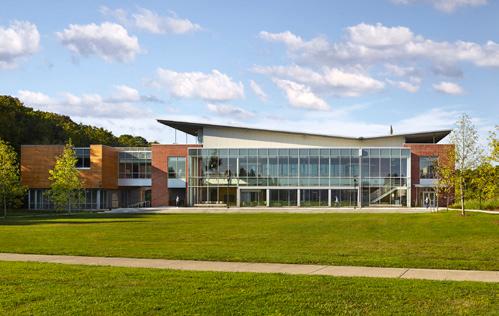
“It’s critical today to emphasize environmental issues across all majors,” Jane explains.
Once Jane realized that Virginia Wesleyan’s new president, Dr. Scott Miller, was responsive to her ideas, more aspects of her collaborative vision came to life. That included the 2016 opening of Batten Honors College, for which she established an endowment.
“I could see that Scott was getting things done,” she explains. As she continued to learn of the Virginia Wesleyan’s needs, her commitment to what was now a university strengthened, and she supported numerous other capital projects around the campus.
Greer Environmental Sciences Center
Who is Jane Batten?
In recent years, Jane has funded more innovative developments at VWU: a 2020 collaboration between VWU Global Campus and Lakeland University in Tokyo, Japan; and the Jane P. Batten & David R. Black School for International Studies, which opened in 2024. She also made the one of two lead gifts to relocate the Virginia Museum of Contemporary Art from the Virginia Beach oceanfront to the VWU campus—and then convinced other well-known philanthropists to join her. The new museum is slated to open in early 2026.
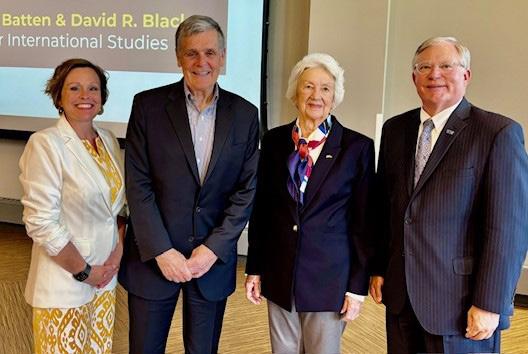
Jane’s belief that education should be accessible to everyone also inspired her in other ways. She co-founded the organization E3: Elevate Early Education and has served on the boards of numerous nonprofits, including the Hampton Roads Community Foundation, YMCA of South Hampton Roads, Slover Library Foundation, and United Way of Hampton Roads. And—acknowledging her love of golf—she funded the creation of First Tee Hampton Roads, a youth development organization that uses golf to create learning experiences.
To reflect her continuing care for the environment, in 2024 she made a transformational gift of $100 million to establish William & Mary’s Batten School of Coastal and Marine Sciences.
It’s no surprise that over her lifetime, Jane’s unwavering support of education and the environment have earned her dozens of awards and accolades—acclaim that she’s reluctant to discuss. Among them are Norfolk’s First Citizen, Old Dominion University’s Hugo Owens Martin Luther King Jr. Memorial Award, CIVIC Leadership Institute’s Darden Award for Regional Leadership, and being named one of Virginia Business’ Most Influential Virginians. In 2024, she was honored by the Virginia Foundation for Independent Colleges for her transformative support of private education in Virginia.
Lakeland University President Dr. Beth Borgen and Dr. Black with Jane Batten and Dr. Miller at the announcement in Wisconsin in June 2024.
Who is Jane Batten?
Today, Jane lives at the Virginia Beach oceanfront in a modest custom home and owns two historic properties on Virginia’s Eastern Shore. “I’m really a loner,” she says. “I love being alone, being in my own head.”
For the last few years she has cultivated a love of poetry, especially the work of Mary Oliver. That passion evolved into a desire to write her own poems, most in the form of haikus.
“They’re like little word puzzles,” she says. A collection of Jane’s poetry, titled “Sunset,” was published earlier this year.
Reflecting on her life’s accomplishments, Jane says she’s most proud of her children. “They’ve turned out well,” she says. “I got out of their way and let them be who they were.”

She also takes pride in what Virginia Wesleyan has become, which is why she has given more to the Virginia Beach-based university than to any other nonprofit.
“I’m very high on this place,” she says. “It always offered a good classroom experience, and now that it’s becoming better known, it’s able to attract a wide range of students. It’s so important to teach them to be critical thinkers.”
In 2025, Jane’s four decades of dedication to Virginia Wesleyan led university leadership to present her with a new proposal: renaming the institution in honor of the Batten family. But persuading her wasn’t easy. Getting her on board with the idea required drafting a white paper about the benefits of the name change, followed by several months of discussions.
When asked about the university’s new name, Jane is clearly uncomfortable. “The rationale makes sense,” she says, “but it’s just embarrassing.”
Summing up her life, Jane says simply that she’s been fortunate. “I often happen to be in the right place at the right time,” she adds. “I’ve been given credit for things I really don’t deserve.”
My mother adopted Virginia Wesleyan, and Virginia Wesleyan adopted my mother. It was a natural pairing. Frank Batten, Jr.
